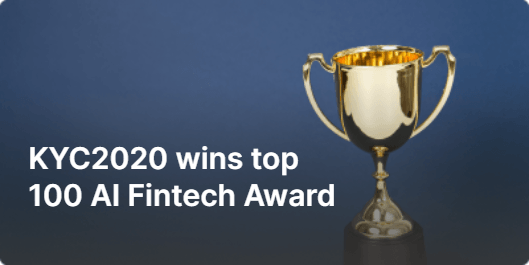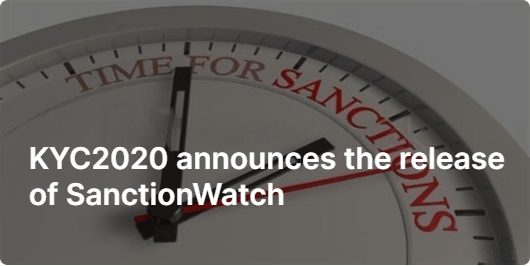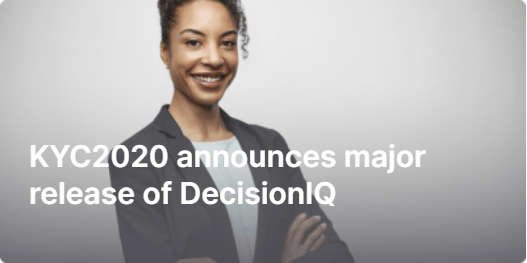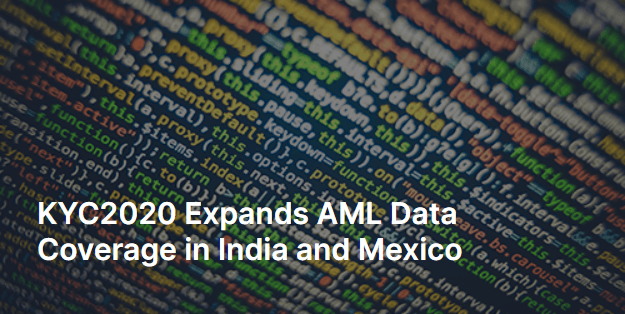
AIFINTECH100 Profiles
How KYC2020 revolutionised sanction monitoring
While people were racing to build FinTech companies, the founders of KYC2020 saw this as a rising opportunity for a RegTech solution.


KYC2020 was founded in 2014 by friends and payments processing industry veterans Rajeev Bahri and Joseph Iuso. For a long-time the pair had discussed ideas around payments, wallets and cryptocurrencies to identify an entry point in the hot and burgeoning sector of FinTech. As they explored FinTech solutions, they noticed there were a lot of issues around regulation and compliance matters and technology solutions were not keeping pace with the needs. Bahri explained that existing regulatory technology (RegTech) solutions were slow, high friction, complex, costly and manpower intensive - the polar opposite of the new FinTech solutions.
Rajeev Bahri, CFA, CAMS, CEO and Head of Product for KYC2020, said, “That is probably my epiphany that we should be in RegTech and not FinTech, and this is how KYC2020 was born with a seed investment from me, and two passionate entrepreneurs coming together to provide the picks and shovels for the gold rush in FinTech and DeFi in a world that was rapidly moving towards-- more sanctions and regulatory compliance.
Reaffirmation of the move to RegTech came after seeing how popular FinTech was becoming, which would cause more companies needing innovative tools to handle compliance burdens. The rise of challenger banks, buy now pay later services, cryptocurrencies, international remittance services, digital payment tools and more, meant more companies were getting involved with finance. As a result, regulators around the world began to increase the scope of regulations and the price of fines for failures.
"A new class of compliance solutions was needed, and that is exactly the problem we wanted to solve."
They initially focused on anti-money laundering compliance and improving global watchlist screening and ongoing monitoring. However, the team quickly found out why existing sanction, PEP, and negative news screening solutions were expensive, had high friction and caused many false positives. It was simply because these tools rely on global sanction and PEP data that was outdated, unstructured, prone to false positives and only available from select vendors. KYC2020 knew how to fix this
Building the platform
KYC2020 was not the first company Bahri had launched, and already had a mature product and software engineering business in India. When starting a new venture, Bahri always follows the same strategy, "Think Big. Start Small. Learn Fast.... Be AGILE!"
The "Think Big" aspect of KYC2020 was to take the harder, more capital-intensive path to build their own structured database composed of data around global sanctions, PEP, RCA, HIO, regulatory authority, criminal, high-risk business, negative news and more. This was the only way to control the price and quality of watchlist screening. They had the scraping and data aggregation technology and in-house expertise, but it would take three years to get the full system ready. Competitors, however, could launch much quicker when licensing the third-party data.
As a result, KYC2020's "Start Small" approach meant that while they worked on the database as part of a five-year plan, they initially launched to market with a point sanction screening solution in a regional market, with a focus on new entrant FinTechs, cryptos and non-financials. Being startups, they needed a low-cost solution, that was real-time and automated.
"We knew that if we could LEARN FAST and build to meet the technology requirements of this client base, we had a platform that would be a game changer in the financial institution and enterprise world once we had realised our grand data vision," Bahri added
The platform
KYC2020 has come a long way since its early beginnings, now boasting clients such as EY, Global Payments, Coinchange, Payment Source and many more.
Bahri explained that onboarding is traditionally a manual process that can take anywhere from 24 hours to 26 days and is plagued by false positives. However, digital payment firms need to shrink the onboarding window to near real- time or they could lose customers. "To revolutionise the onboarding space, one must design systems powered by AI to automate clearing of false positives that are coupled with case and workflow management systems designed to improve human efficiency and effectiveness. This is exactly what our DecisionIQ does."
KYC2020 currently offers two watchlist and adverse media screening solutions. The first is SmartScan, a traditional screening solution that leverages new search technologies and name variant determination algorithms. Its other solution is its flagship product DecisionIQ, which Bahri describes as "a game change and will revolutionise the client onboarding space.
One area the solution is really making a difference is persistent monitoring. Bahri said, "Getting compliant is painful - staying compliant should not be more painful." Unfortunately, that is the situation that many face, relying on slow and periodic rescan tools.
"If onboarding systems are high manual effort. The ongoing monitoring systems are worse. Banks today burn money - and I quote Elon Musk with a different context - today's ongoing monitoring systems for banks are 'gigantic money furnaces.'' I am confident we are solving this problem with our latest release of DecisionIQ... it will have a built-in, persistent monitoring service we are calling Sanction Watch." This service will help firms keep up to date with any change on global sanction lists.
The revolution is DecisionIQ
Bahri outlined three major ways DecisionIQ differentiates itself from competitors. The first is the data it leverages, by aggregating and structuring its own global watchlist data. "We call it 'Smart' data because AI and NLP, along with good ol' fashioned human smarts, are used to clean, normalise, and deduplicate the data to reduce the number of false positives at the source. In fact, we have several screening solution providers that licence our structured data, from Acuant to Deep Discovery and more.
The second differentiator is its approach to screening. Bahri explained that unlike other products that produce 'scored' hits with a high number of false positives, DecisionIQ automatically clears the false positives and delivers real- time actionable screening decisions. As with any AI, there are often concerns around transparency, but DecisionIQ provides 'proof-of-work' that is auditor-friendly.
Bahri said, "This is a very important differentiator because at the end of the day, when it comes to AML compliance and avoiding fines, what you must prove to the authorities is that you have a rational decision system that is comprehensible by humans and is easy to audit!"
Its final core differentiator is its API-first approach along with all the features that go into delivering an enterprise class service. The founders have over 50 years of combined software delivery experience. "We have built major systems that have been deployed across Fortune 100 banks and payment processors. We know a thing or two about enterprise requirements, from data privacy, security, auditability, to controls and customizability.” said Bahri. The platform was built for easy integration into third-party workflows and can be fine-tuned to meet the specific needs of a system.
Bahri outlined a success story that showed the power of DecisionIQ. It was a major DeFi company in Canada that does yield farming on crypto assets. Within weeks of launching their platform, they were met with over 50,000 new users that needed to be screened. "With their standard screening solution, even at low fuzzy search they would be dealing with 20% false positives, or over 10,000 hits to clear with only one AML staff. They had to reconcile this with the reality that the new users expected account setup and service within 24 - 48 hrs, which was impossible even if they had 10 staff working full-time."
They approached DecisionIQ and leveraged the rapid clearing system, RABBIT. This is a learning system that can identify patterns and establish clearing rules. It reduced false positives to under 3% and helped the company respond quickly to its new users.
Overcoming challenges
One of the biggest challenges the company faced was around data aggregation for PEPs from emerging countries. Due to poor maintenance of data on public sources, this has required more manual oversight than hoped, but KYC2020 is dedicated to overcoming the challenge.
Another major challenge came during the early development of DecisionIQ, with optimisation around excessive false positives and negatives when dealing with fuzzy search and scoring. AI proved unhelpful because there were too many edge cases and humans were better at handling them, particularly in foreign names.
"We solved this problem by developing our own Name Relevancy Scoring system based on how humans interpret names, developing a hit pattern recognition system, and then incorporating all this into a rule-based clearing system that could be customized and trained to supplement our AI. This is our Decision Oversight and Governance System (aka "DOG"), and joke that 'DOG is an AML officers' best friend.' If you were to use it, you would agree."
Future plans
In August 2022, KYC2020 plans to launch a major update for DecisionIQ, which includes powerful new functions, such as rapid review and case management for high- volume screening. It also plans to make advancements to its persistent monitoring system to reduce false alerts from ongoing monitoring to near zero, improvements to the NLP technology, entity resolution and relevancy analysis in its Adverse Media Check service and much more. KYC2020, which has over 200 customers, believes its journey has only just started and there is much more to come.
As to why a company should work with KYC2020, Bahri said, "I would say because we have a great product that lowers overall cost of watchlist screening and speeds up customer onboarding. But mostly because a) they get to try for FREE before making a buy decision, and b) they are always dealing with CAMS certified and/or VSKILLS certified AML specialists that are fully vested in their success."












